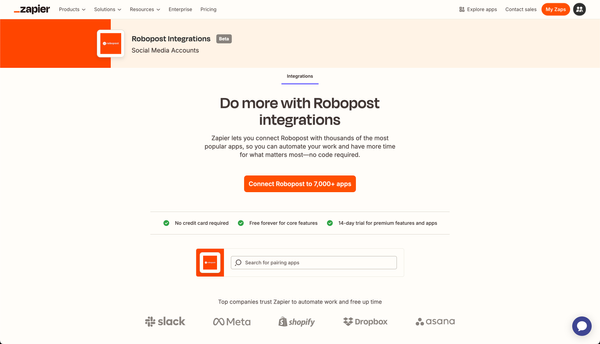Advantage of Using Social Media Automation Tools
Explore how social media automation boosts engagement, streamlines marketing, and enhances strategy for competitive success.

In digital marketing, social media automation tools are a big advantage for businesses. These tools make operations more efficient, boost engagement, and help with strategic decisions. By looking at how automation tools benefit companies like Company X and exploring different aspects of automated marketing, we can see the major benefits they bring to social media marketing.
Key Takeaways
- Scheduling tools are crucial for keeping a consistent online presence and posting during peak engagement times without manual effort.
- Automation tools improve marketing efficiency by cutting down on manual work and boosting collaboration, which leads to better use of resources and scalability.
- The future of digital marketing with automation tools is about creating a responsive and personalized marketing system that encourages innovation and creativity.
Maximizing Engagement with Social Media Automation

Scheduling Tools: The Key to Consistent Online Presence
Being consistent is crucial in social media. Scheduling tools like Robopost help maintain a steady online presence, ensuring your audience always sees your content, even when you’re not online. These tools let businesses carefully plan their social media posts to match peak user activity times, boosting visibility and engagement.
- Automated Posts: Schedule your content to reach users when they’re most active.
- Easy Scheduling: Share content effortlessly across different platforms.
- Consistent Presence: Maintain a steady presence without posting manually every day.
Automation simplifies content distribution and allows you to refine your social media strategy. It gives flexibility to respond to real-time events and trends while keeping content flowing smoothly.
Using scheduling tools strategically can change how businesses connect with their audience. It's not just about saving time; it's about creating a responsive and effective content strategy that keeps your brand top of mind.
Analytics and Performance Tracking: Making Data-Driven Decisions
Using analytics and performance tracking is essential for making smart decisions in social media marketing. These tools show how well campaigns are doing, allowing marketers to quickly adjust strategies for better results.
By using analytics tools, businesses can understand customer behavior, measure campaign success, and improve overall marketing effectiveness. This helps in optimizing processes and personalizing interactions.
For example, an online magazine might track page views, time spent on articles, and user demographics to find out which topics their audience likes. This information helps refine content strategy and boost audience engagement.
Key benefits of using analytics tools in social media automation include:
- Real-time data for quick decisions
- Accurate insights from data analysis
- Personalization to boost engagement and conversions
Custom software tools provide real-time insights, helping businesses understand customer behavior and preferences better. Tracking key metrics and analyzing data leads to more personalized marketing campaigns and higher customer satisfaction.
Streamlining Marketing Operations with Automation Tools
The Role of Automation in Reducing Manual Labor
Automation is a major benefit for businesses, especially in reducing manual work. Automating repetitive tasks like data entry, scheduling, and customer follow-ups can greatly improve efficiency and productivity. This allows employees to focus on more strategic and creative tasks, adding more value to the organization.
Automation increases efficiency, cuts down on manual work, and ensures all website components stay updated and functional.
By shifting human resources to higher-value tasks, companies can better allocate resources and reduce labor costs. This strategy lowers operational expenses and increases the return on investment (ROI).
Scheduled Posts and Email Campaigns: Examples of Marketing Efficiency
Using automation in marketing campaigns has changed how businesses connect with their audience. Scheduling posts and email campaigns means companies can stay consistently active without constant manual effort. This ensures messages go out at the best times and allows human resources to be used more strategically.
Automation tools bring a level of accuracy and personalization in marketing that was not possible before. They help send tailored messages to the right people at the right time, increasing the chances of engagement and conversion.
The benefits of automation go beyond just saving time:
- Time-saving efficiency: Automating repetitive tasks lets marketers focus on more important activities.
- Personalized communication: Automated campaigns use customer data to send highly relevant content.
- Lead nurturing: Automation ensures consistent follow-ups, so no potential customer is missed.
In short, marketing automation tools are about improving quality, not just quantity. They allow for tracking, measuring, and adjusting campaigns in real time, leading to a more effective and dynamic marketing strategy.
Understanding Automated Marketing Tools and Their Impact
The Comprehensive Role of Social Media Management Tools
Social media management tools are essential in digital marketing. They allow businesses to schedule and automate social media posts, keeping a consistent and strategic online presence. This helps companies stay connected with their audience even during off-hours or peak times.
These tools do more than just posting; they also provide strong tracking and analytics features. Marketers can check engagement levels, see how different content performs, and understand audience behavior. This information is vital for improving marketing strategies and getting better results.
Using social media management tools isn't just about saving time; it’s about improving the quality of interactions and the insights gained from them.
For example, timing affects social media engagement. A well-timed post that matches user activity patterns can greatly increase interactions. Here's how a typical tool can help with post scheduling:
- Analyze user activity to find peak engagement times
- Schedule posts to match these high-activity times
- Monitor results and adjust scheduling as needed
By following this method, businesses can see more likes, shares, and overall engagement, leading to higher sales and audience growth.
Data Analysis and Reporting: Gaining Insights for Strategic Planning
In digital marketing, automating data analysis and reporting is crucial for success. Automation tools help marketers quickly gather and evaluate large amounts of data, such as social media metrics and email campaign statistics. This process not only improves accuracy but also provides valuable insights for making informed decisions.
Using automated reporting, businesses can track and adjust their marketing strategies in real time. This ability to respond quickly to data allows for a more flexible marketing approach, enabling rapid changes to improve campaign performance.
Automated data analysis saves significant time and resources. This allows marketers to focus on higher-level strategic tasks instead of manual data processing. Here’s how automation impacts key marketing metrics:
Metric | Pre-Automation | Post-Automation |
|---|---|---|
Engagement Statistics | High manual effort | Automated tracking |
Follower Growth | Slow analysis | Quick trend identification |
Campaign Performance | Inconsistent reporting | Streamlined insights |
Email Open Rates | Delayed response | Immediate action |
The benefits of automation in data analysis and reporting are clear. It helps businesses make more data-driven decisions and ensures a consistent and accurate understanding of marketing campaign effectiveness.
The Competitive Edge: How Automation Tools Transform Marketing Strategies
In digital marketing, automation tools are crucial for improving engagement strategies. These tools simplify processes and enable real-time data analysis, giving marketers the flexibility to adapt quickly to changes in the digital landscape.
Automation tools allow for precise and personalized marketing strategies that connect deeply with target audiences.
Using automation tools can greatly improve key performance indicators. Here's how automation can enhance marketing outcomes:
Metric | Without Automation | With Automation |
|---|---|---|
Response Time | Slower | Immediate |
Campaign Reach | Limited | Expanded |
Engagement Rates | Lower | Higher |
Conversion Rates | Inconsistent | Improved |
Adopting these tools not only streamlines operations but also adds sophistication to marketing campaigns, ensuring they are data-driven and tailored to the audience's needs.
Conclusion
Using social media automation tools gives businesses a big edge in digital marketing. These tools can increase engagement, website traffic, and sales. Automating repetitive tasks helps businesses maintain a steady online presence and allows more time for strategic work. The future of digital marketing will heavily rely on automation for creating responsive, personalized, and efficient marketing systems. Companies that adopt these tools will be better equipped to handle the constantly changing digital world and meet their audience's needs.
